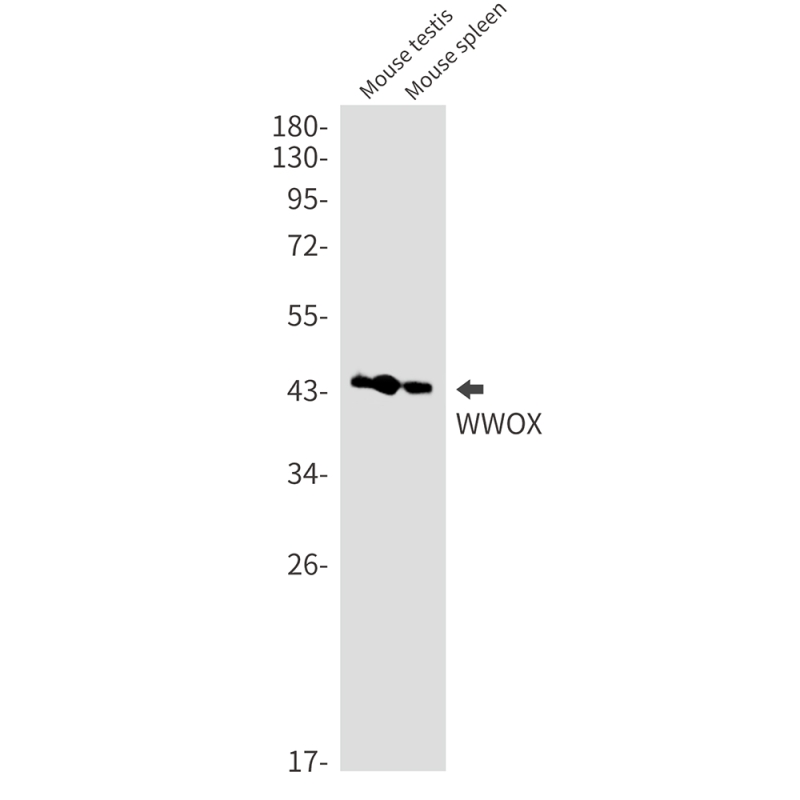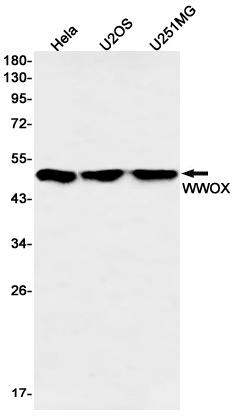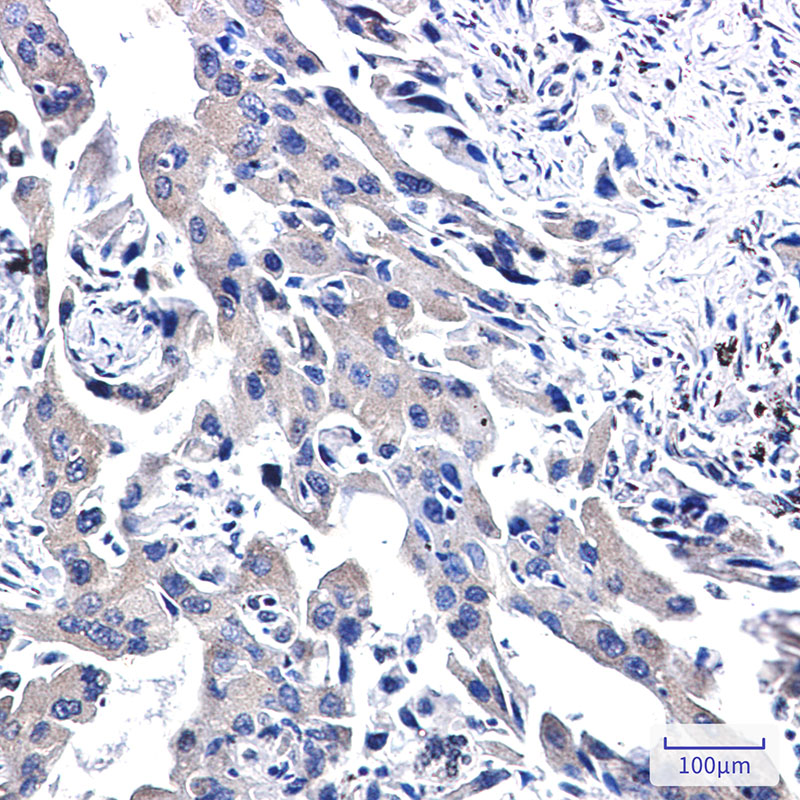


| WB | 1/500-1/1000 | Human,Mouse,Rat |
| IF | 1/20 | Human,Mouse,Rat |
| IHC | 1/50-1/100 | Human,Mouse,Rat |
| ICC | 技术咨询 | Human,Mouse,Rat |
| FCM | 咨询技术 | Human,Mouse,Rat |
| Elisa | 咨询技术 | Human,Mouse,Rat |
| Aliases | FOR; WOX1; EIEE28; FRA16D; SCAR12; HHCMA56; PRO0128; SDR41C1; D16S432E |
| Entrez GeneID | 51741 |
| WB Predicted band size | Calculated MW: 47 kDa; Observed MW: 47 kDa |
| Host/Isotype | Rabbit IgG |
| Antibody Type | Primary antibody |
| Storage | Store at 4°C short term. Aliquot and store at -20°C long term. Avoid freeze/thaw cycles. |
| Species Reactivity | Human,Mouse |
| Immunogen | Recombinant protein of human WWOX |
| Formulation | Purified antibody in TBS with 0.05% sodium azide,0.05%BSA and 50% glycerol. |
+ +
以下是关于WWOX抗体的3篇参考文献及其摘要概括:
1. **文献名称**:*WWOX loss induces genomic instability in vitro and in vivo*
**作者**:Aqeilan RI, et al.
**摘要**:研究利用WWOX特异性抗体分析WWOX蛋白在肿瘤模型中的表达缺失,发现其缺失导致基因组不稳定性增加,提示WWOX作为肿瘤抑制因子的潜在机制。
2. **文献名称**:*WWOX modulates the Wnt/β-catenin pathway by regulating Dvl2 phosphorylation and membrane translocation*
**作者**:Khalaileh A, et al.
**摘要**:通过Western blot和免疫荧光技术(使用WWOX抗体),阐明WWOX蛋白通过调控Dvl2磷酸化影响Wnt信号通路,进而抑制肿瘤细胞增殖。
3. **文献名称**:*Alterations of the WWOX gene in human gliomas: A combined analysis using array CGH and immunohistochemistry*
**作者**:Mahajan NP, et al.
**摘要**:结合WWOX抗体免疫组化分析,发现神经胶质瘤中WWOX基因表达显著下调,且其缺失与肿瘤恶性程度及患者预后不良相关。
4. **文献名称**:*WWOX as a biomarker for Alzheimer’s disease: Insights from mouse models*
**作者**:Sze CI, et al.
**摘要**:利用WWOX抗体检测阿尔茨海默病小鼠脑组织,发现WWOX表达异常与tau蛋白过度磷酸化相关,提示其在神经退行性疾病中的潜在作用。
(注:以上文献为领域内代表性研究主题的概括,具体文献标题和作者可能有调整,建议通过PubMed/Google Scholar核实完整信息。)
The WWOX (WW Domain-Containing Oxidoreductase) antibody is a crucial tool for studying the WWOX protein, encoded by the *WWOX* gene located on chromosome 16q23.3-24.1. This gene spans the common chromosomal fragile site FRA16D, making it prone to alterations in cancers and other diseases. The WWOX protein contains two N-terminal WW domains (mediating protein-protein interactions) and a central short-chain dehydrogenase/reductase (SDR) domain, suggesting roles in cellular metabolism, apoptosis, and tumor suppression.
WWOX functions as a tumor suppressor by interacting with transcription factors (e.g., p73. AP-1) and signaling pathways (e.g., Wnt, Hippo), regulating cell growth, differentiation, and stress responses. Its loss or reduced expression is linked to cancers (breast, ovarian, lung), neurological disorders (epilepsy, Alzheimer’s), and metabolic syndromes. WWOX antibodies are widely used in Western blotting, immunohistochemistry (IHC), and immunofluorescence (IF) to detect protein expression, localization, and post-translational modifications.
Research utilizing WWOX antibodies has highlighted its dual role in tumorigenesis and neural homeostasis, with emerging evidence in DNA damage repair and oxidative stress. Validating antibody specificity (via knockout controls) is critical due to homology with other WW domain-containing proteins. These antibodies are pivotal for exploring WWOX's molecular mechanisms, therapeutic potential, and diagnostic applications in diseases marked by chromosomal instability or metabolic dysregulation.
×